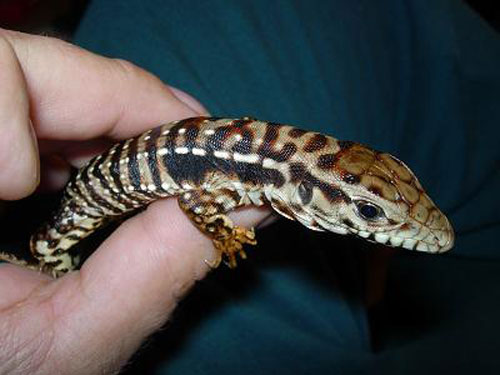Argentine black and white tegu at the Buenos Aires Zoo.
The following are several health concerns a tegu owner should watch for. As always, if you feel your tegu is sick, please visit a qualified herp veterinarian.
Read More
Argentine Black and White Tegu Care Sheet
Build The Perfect Indoor Tegu Enclosure
Metabolic Bone Disease
The biggest problem I have seen as far as health problems in tegus is Metabolic Bone Disease. I have seen the characteristic twitching of early MBD before in tegus that did not have UVB lighting; it is not a pretty sight. Basically, some of the animals looked like they were suffering minor convulsions. This can also happen if tegus overheat. Monitor your environmental controls closely to provide the right temperature and lighting for your lizards.

Bobby Hill
Red tegu (Tupinambis rufescens) A number of health problems can be present in your tegu and should be watched for.
Metastatic calcification and gout are seen in lizards with MBD. Gout is a common clinical sign of this problem. Calcium hydroxyapatite deposits usually appear as irregular, firm swellings over joints on the limbs, on ribs and back bones. They can also be seen on an animal’s head, making them appear disfigured.
Calcium and Phosphorus Deficiency
I suspect that calcium deficiency is probably the leading killer of tegus in captivity. However, a diet abundant in calcium will not help if a calcium-to-phosphorus ratio of 2:1 is not provided. Avoid foods high phosphorus, like that found in bananas. Calcium will also be a useless if vitamin D3 is not present. The good news is that vitamin D3 is easily obtained through exposure to unfiltered sunlight or UV lighting. Tegus fed rodents and given proper UV lighting do not require added D3.
Salmonella
This can be is found in the intestinal tracts of reptiles, birds, animals, insects and humans. It is also found on the outside of the eggshell before the egg is washed, or it may be found inside the egg if Salmonella infected the hen. Be careful when feeding lizards eggs. Raw eggs also contain an enzyme called avidin; this enzyme decreases the absorption of biotin and can lead to skin problems in reptiles. When you cook the eggs you neutralize this enzyme, thus changing the makeup of the egg.
Internal parasites
A tegu infested with parasites can experience a loss of appetite and eventually weight loss. Their stools may be loose and they could behave lethargically, even when not hibernating. If you see any of these, contact your veterinarian.
External Parasites
Mites and ticks have not been found to be as much of a problem in the Tupinambis species. I think the tegu’s beaded skin is one reason these parasites do not often appear on these lizards. Tegus have very thick skin and beaded scales, and this may prevent parasites from accessing a blood supply to feed on.



